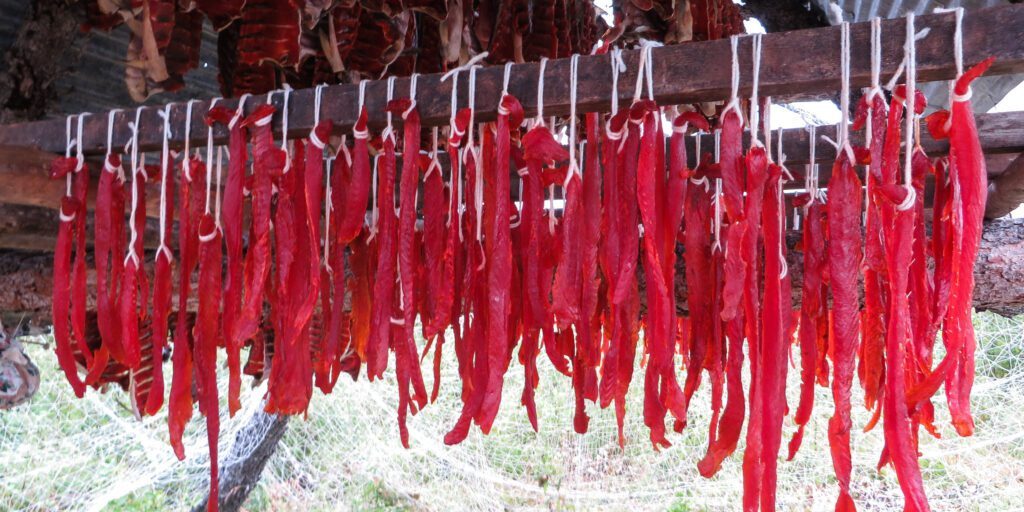Three new businesses, including a smokehouse-inn combo, are set to get off the ground by summer of 2020 in Western Alaska. All of them are supported by Norton Sound Economic Development Corporation (NSEDC) grant funds and seek to fill gaps in their respective communities.
KNOM’s Davis Hovey highlights this year’s three Small Business Initiative winners and their regional business plans:
“I’m Jessica Farley, and I am a recent winner of NSEDC’s small business initiative for the Noxapaga smokehouse and Inn.”
– Jessica Farley
Farley says the name Noxapaga refers to a tributary of the Kuzitrin River outside of Nome and she wanted this original name from the region to be associated with her new building. According to the Nome business owner the Inn could be open within the next two months, while the separate facility with a smokehouse and kitchen could be open in the summer of 2020.
“In this region we have some tremendous smoked salmon, great producers of it, but none of it is available retail, none of it is available wholesale. Even locally you’ll find smoked salmon from outside of the region and I got this idea from the Copper River fishermen. They smoke and sell their own salmon, [and I was thinking] ‘wow we could do that in Nome if we have the facilities…’”
– Jessica Farley
Farley plans to sell at least 2,000 jars of smoked salmon per year to make the business profitable which would involve using her business’s commercial kitchen, equipped to accommodate the production of smoked seafood. And according to Farley, once her two weeks’ worth of smoking is done in the smokehouse and kitchen, then the facility would be opened up to others who want to rent the space.
“There are so many talented cooks and producers of goods in our region that I thought ‘if we could just take this space and rent it so that other people could produce their goods, so that they could wholesale or resale,’ I thought it would be a really great thing for our local economy”
– Jessica Farley
The Noxapaga Inn owner says two suites will be available to rent, for any tourists or visitors who are interested in staying there.
Jessica Farley noted that Farley Mobile Sales and Repair was awarded an NSEDC Small Business Initiative grant during the last cycle in 2017, which is owned by Jessica’s husband Howard Farley Jr. Therefore she says she was surprised her business was selected as a grant winner.
Another Nome-based business, that stands to benefit the region, is the Rural Alaska Animal Resources LLC, led by Emily Stotts.
“Call it RAAR for short. The idea came to me ten years ago and we were living in Shaktoolik at the time. It came up that someone needed help with their animals, and nobody was there, and I wanted to help. So, we did it and it was just for free. And I’ve been working as a PAWS volunteer for free for many years, and I just saw a lot of gaps in what’s available here, and I want to fill those gaps”
– Emily Stotts
Stotts says some of the gaps that exist between what PAWS and the Animal House of Nome provide include certain emergency veterinary services and more affordable vet care in general. The animal resource center will be built on Stott’s property in Nome and ready by June. Stotts says she will do what needs to be done for regional animals, as long as Bering Strait communities are willing to pay her subscription fee.
“Imagine someone in Wales wants to get their animal spayed, someone in Anchorage gives free spays, but who in Nome is going to pick up the animal from the rural airline, take care of it, get it to its flight on Alaska Airlines to Anchorage, then after its recovery take care of it on the way back and get it back to you? My partners in Anchorage and the Valley offer those services for free, so I can cover the cost of the kennel, the transport, the care, the recovery…”
– Emily Stotts
According to Stotts she ran a similar service in Shaktoolik but was doing more services for free and that’s what caused the business to fail. She anticipates RAAR being profitable as long as she is getting five animals or more per $5,000 village subscription. Stotts plans to donate some of the revenue from her rural animals’ business to PAWS and other related non-profits.
The final NSEDC SBI grant of 2019 went to John and Arlene Waghiyi of Savoonga. John didn’t want his voice recorded for this story, but he said by phone that St. Lawrence Island Drumbeats is a business meant to feature and promote indigenous artwork such as ivory carvings.
Both John and his wife Arlene have made and sold traditional drums from walrus stomachs for years. Now in addition to their existing work, the Waghiyis plan to buy artwork directly from local artists and sell them during their trips to other cities in Alaska.
John says he is excited about this small business because this will be what he describes as the first opportunity for a St. Lawrence islander, who knows the subsistence way of life, to be the middle man for local carvers and artists.
All three grant recipients thanked NSEDC for selecting their business ideas and awarding them the funds.
NSEDC announced the winners on October 21st and awarded the Noxapaga Inn $50,000, Rural Alaska Animal Resources LLC $50,000, and St. Lawrence Island Drumbeats $35,800.
NSEDC encourages future applicants to enter the next Small Business Initiative competition in 2021.
Image at top: Strips of salmon drying at camp before they can be smoked. Photo from Laura Kraegel, KNOM file.




